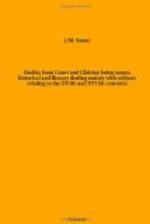“Henry Morgan was esteemed a most admirable civilian and canonist; he was for several years the constant Moderator of all those that performed exercise for their degrees in the civil law in the scholar schools, hall and church pertaining to that faculty, situated also in the same parish . . . . He was elected Bishop of St. David’s, upon the deprivation of Robert Ferrar . . . . In that see he sate till after Queen Elizabeth came to the Crown, and then being deprived . . . retired among his friends, and died a devoted son to the Church of Rome, on the 23rd of December following (1559) of whose death, hear I pray what John Foxe saith in this manner: Morgan, bishop of St. David’s, who sate upon the condemnation of the blessed Martyr and Bishop Ferrar, and unjustly usurped his room, was not long after stricken by God’s hand, but after such a strange sort, that his meat would not go down, but rise and pick up again, sometimes at his mouth, sometimes blown out of his nose, most horrible to behold, and so he continued till his death. Thus Foxe, followed by Thomas Beard in his Theatre of God’s Judgments. But where or when his death happened, they tell us not, nor any author hitherto, only when, which Bishop Godwin mentions. Now, therefore, be pleased to know that the said Bishop Morgan, retiring after his deprivation to and near Oxen, where he had several relations and acquaintance living, particularly the Owens of Godstow, in the parish of Wolvercote, near to the said city, did spend the little remainder of his life in great devotion at Godstow, but that he died in the condition which Foxe mentions there is no tradition among the inhabitants of Wolvercote. True it is that I have heard some discourse, many years ago, from some of the ancients of that place, that a certain bishop did live for some time, and exercised his charity and religious counsel among them, and there died; but I could never learn anything of them of the manner of his death, which being very miserable, as John Foxe saith, methinks that they should have a tradition of it, as well as of the man himself; but I say there is now none, nor was there any thirty years ago, among the most aged persons then living at that place, and therefore, whether there be anything of truth in it may justly be doubted.”
The evidence of this negative tradition is certainly more convincing, than Foxes unsupported allegation of a circumstance, as unlikely to have occurred, as it was likely to be concocted by a man of his propensity and unscrupulousness. If, however, there should be any doubt of Foxes ability to concoct such a story, it will perhaps be removed by the history of the drastic refutation, which befell the similar story of the end of Grimwood. This, Anthony a Wood proceeds to record in a passage immediately after the one above quoted.




